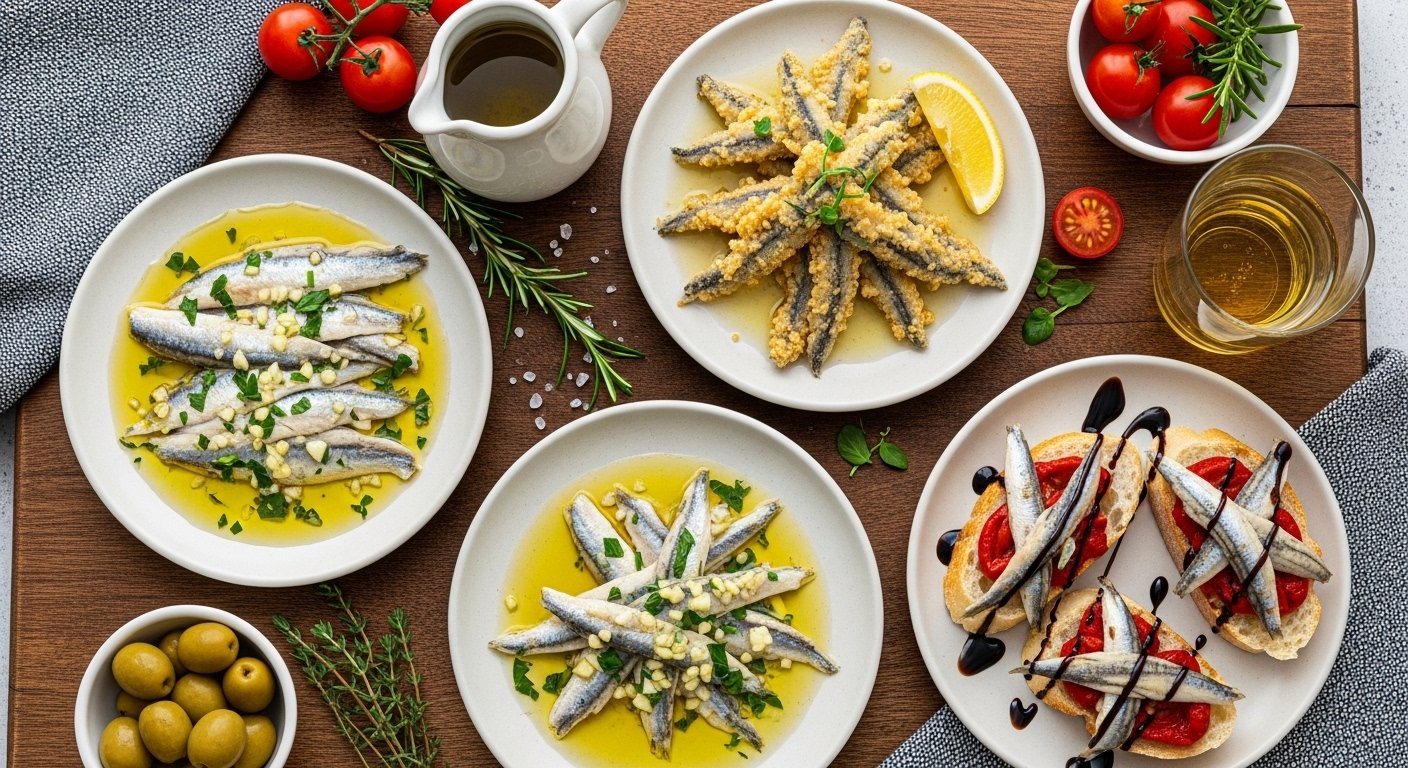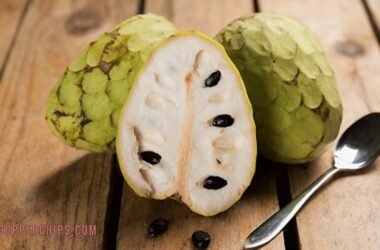Boquerones are one of the Mediterranean’s most cherished seafood delicacies, celebrated for their delicate flavor, versatility, and nutritional value. Commonly known as anchovies in English, boquerones are small, silvery fish that have become a symbol of coastal cuisine in countries like Spain and Italy. While anchovies are often associated with strong, salty flavors, boquerones — particularly when prepared in vinegar or olive oil — offer a far more subtle, refreshing taste that captures the essence of the sea.
In this article, we’ll explore the origins, preparation methods, health benefits, and cultural importance of boquerones, uncovering why they have become such a beloved dish across the Mediterranean and beyond.
The Origins and History of Boquerones
Boquerones have a long-standing connection to Mediterranean fishing traditions that date back centuries. Ancient civilizations such as the Greeks and Romans were known to preserve anchovies in salt and brine, creating a staple source of protein that could last through long voyages or harsh seasons.
The word boquerón itself comes from Spanish, referring to the fresh or lightly marinated form of anchovies rather than their salt-cured counterpart. Coastal towns along Spain’s Andalusian and Catalan shores have been perfecting this preparation method for generations, often using family recipes passed down through time.
From humble fishermen’s catches to high-end tapas menus, boquerones have transcended social and culinary boundaries, evolving from a necessity into a refined delicacy.
Boquerones vs. Anchovies: What’s the Difference?
While the terms “boquerones” and “anchovies” are sometimes used interchangeably, there’s a clear distinction between the two. Both come from the same species of fish — Engraulis encrasicolus — but the preparation and curing methods create very different flavor profiles.
- Boquerones are typically served fresh or marinated in vinegar and olive oil, resulting in a bright, tangy, and mild flavor.
- Anchovies, on the other hand, are preserved in salt and oil, giving them a stronger, more intense taste that’s often used in sauces and pizzas.
This distinction has made boquerones a favorite among those who prefer lighter, more refreshing seafood dishes, especially when paired with crisp wines or Mediterranean salads.
The Art of Preparing Boquerones
The preparation of boquerones is as much a craft as it is a tradition. The process begins with cleaning and deboning the fresh fish, usually caught from the Mediterranean or Atlantic waters. Once cleaned, they are soaked in vinegar for several hours — a step that “cooks” the fish through acidity, turning their flesh from translucent to white.
After marination, the fish are rinsed, dried, and then placed in a mixture of high-quality olive oil, garlic, and parsley. Some variations also include a touch of lemon juice or chili for added zest.
The result is a dish that’s light, flavorful, and bursting with freshness. In Spain, boquerones en vinagre (anchovies in vinegar) are typically served as tapas alongside olives, crusty bread, or a chilled glass of white wine.
Culinary Variations Across the Mediterranean
Boquerones may be quintessentially Spanish, but variations of the dish can be found throughout the Mediterranean.
- In Italy, they are known as acciughe marinate, often prepared with white wine vinegar and served as antipasti.
- In Greece, marinated anchovies are seasoned with oregano and lemon juice, reflecting the country’s love for citrus and herbs.
- In Morocco and Tunisia, anchovy dishes are often spiced with cumin and coriander, blending Mediterranean and North African influences.
Each region brings its own flair to boquerones, showcasing the cultural adaptability of this simple yet elegant fish.
Health Benefits of Boquerones
Beyond their exquisite taste, boquerones are a nutritional powerhouse. They are rich in omega-3 fatty acids, which support cardiovascular health and brain function. These essential fats help reduce inflammation and lower bad cholesterol levels, making them an excellent choice for maintaining a healthy diet.
Additionally, boquerones are high in protein, calcium, and vitamins such as B12 and D. Their low calorie and fat content make them ideal for those looking to enjoy flavorful yet balanced meals.
Because boquerones are marinated rather than fried, they retain much of their natural nutritional value. Combined with olive oil — a staple of the Mediterranean diet — this dish embodies the principles of heart-healthy eating.
Boquerones in Spanish Cuisine
In Spain, boquerones are more than just a dish — they’re a cultural tradition. You can find them in almost every tapas bar, from Madrid to Málaga, where they’re served as both a standalone delicacy and a complement to other small plates.
Boquerones en vinagre are especially popular in Andalusia, where they are often served with potato salad or cold gazpacho. Meanwhile, in northern regions like the Basque Country, they’re paired with cider and pintxos (small bar snacks).
In coastal restaurants, boquerones fritos (fried anchovies) are another beloved version, lightly battered and fried until golden. This variation highlights the fish’s natural flavor while adding a satisfying crunch.
Pairing Boquerones with Food and Drinks
The mild acidity and light texture of boquerones make them incredibly versatile for pairing with various foods and drinks.
Best pairings include:
- Crisp white wines like Albariño or Verdejo.
- Light beers or Spanish cider.
- Fresh salads with citrus dressings.
- Toasted bread or crostini with tomato and olive oil.
Their tangy profile balances rich or fatty foods beautifully, making them a great accompaniment to charcuterie boards and creamy cheeses. Whether served as an appetizer or main dish, boquerones add a burst of brightness to any meal.
Sustainability and Fishing Practices
As global demand for boquerones and anchovies continues to grow, sustainable fishing practices are becoming increasingly important. Overfishing can threaten the delicate balance of marine ecosystems, particularly in the Mediterranean Sea.
Many fisheries now follow stricter guidelines to ensure the species’ long-term survival, including seasonal restrictions and catch limits. Consumers can support sustainable seafood by choosing boquerones certified by organizations such as the Marine Stewardship Council (MSC).
Sustainability not only protects the environment but also guarantees the continued availability of high-quality seafood for future generations.
How to Enjoy Boquerones at Home
Boquerones are surprisingly easy to enjoy at home, whether you buy them fresh from a local market or preserved in jars. To recreate the classic Spanish tapa:
- Clean and fillet the anchovies carefully.
- Marinate them in white wine vinegar for 3–4 hours until they turn opaque.
- Drain and arrange them in a shallow dish.
- Add finely chopped garlic and parsley.
- Cover with extra virgin olive oil and refrigerate for a few hours before serving.
Serve your boquerones with fresh baguette slices, olives, or roasted peppers for an authentic Mediterranean experience.
For convenience, you can also find ready-to-eat boquerones in specialty grocery stores or online. They make an excellent addition to salads, sandwiches, and charcuterie platters.
The Enduring Appeal of Boquerones
The enduring charm of boquerones lies in their simplicity and balance. They capture the spirit of Mediterranean living — fresh, healthy, and deeply connected to the sea. Whether enjoyed in a bustling tapas bar in Seville or prepared at home with friends, boquerones remind us that great food doesn’t need to be complicated.
They embody centuries of culinary tradition while remaining perfectly suited for modern tastes. With their clean flavor, nutritional benefits, and cultural richness, boquerones continue to stand as a symbol of coastal cuisine and Mediterranean hospitality.
Conclusion
Boquerones are more than just a dish — they are a celebration of flavor, culture, and craftsmanship. From their humble origins in fishing villages to their status as gourmet delicacies, these small fish represent the very best of Mediterranean cuisine.
Their versatility allows them to fit into countless dishes, from refreshing appetizers to sophisticated pairings with wine and cheese. Whether you savor them for their taste, health benefits, or cultural significance, boquerones offer an experience that connects the palate with the sea.
As Mediterranean cuisine continues to gain global recognition, boquerones stand proudly at its heart — simple, elegant, and timeless.








